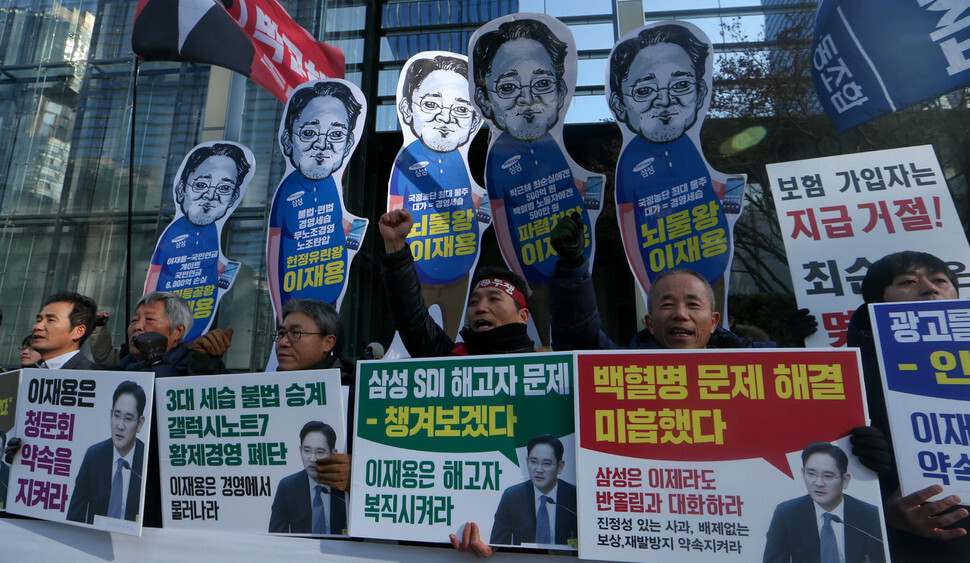hankyoreh
Links to other country sites 다른 나라 사이트 링크
Targeting Park’s bribery and Samsung, special prosecutors’ investigation to start

On Dec. 21, the special prosecution team led by Park Young-soo will be holding a “signboard-hanging ceremony,” signaling the official start of its investigation. Within the next week, South Koreans are likely to get answers for some of their biggest questions about the investigation, such as whom the prosecutors will be questioning first.
“We are planning to have the signboard-hanging ceremony on the morning of Dec. 21. This week you might hear about the first people we will be questioning,” said Lee Gyu-cheol, Park’s spokesperson, during a press briefing on Dec. 18.
The Special Prosecutor Act gives the special prosecutor 20 days to prepare for the investigation after his appointment on Dec. 1. But Park’s team said they could start the investigation at any time, even during the preparatory period, hinting that they could start using compulsory investigation techniques such as raiding offices even before the investigation is officially launched on Dec. 21.
Park and his team are putting the most effort into proving charges of bribery against President Park Geun-hye. The fourth investigation team, led by Yun Seok-yeol, suspects that the chaebol promised Park they would donate money to the Mir and K-Sports Foundations in exchange for her help on urgent issues. Investigators are also seriously considering whether these two foundations were designed to benefit Park after she left office. While Park denies that there was any quid pro quo, a substantial amount of evidence supporting these charges turned up during the prosecutors‘ investigation, and the special prosecutor’s team thinks it will be possible to prove the quid pro quo.
Among the 53 companies that donated money to the Mir and K-Sports Foundations, the special prosecutor’s team is mainly targeting Samsung, Lotte and SK, where there is particularly strong evidence of a quid pro quo relationship. Since each of these chaebol had different motivations at the time, the prosecutors have reportedly prioritized their investigation according to how much the chaebol donated and what issues they were facing.
Perhaps the special prosecutor’s biggest target is Samsung, which donated the most money to the foundations. The team’s primary goal is to determine whether Samsung Electronics Vice Chairman Lee Jae-yong was involved in the donations to the Mir Foundation and in directly supporting Choi Sun-sil and her daughter Jung Yu-ra. The special prosecutor’s team also warned that it might investigate multiple targets at the same time. “There are quite a few people that we need to investigate, so we might be looking at several places at the same time,” Lee Gyu-cheol said.
Another big job for the special prosecutor is to investigate former presidential Chief of Staff Kim Ki-choon and former Blue House Senior Secretary for Civil Affairs Woo Byung-woo. The second investigation team under Lee Yong-bok is currently looking into several charges connected with these two figures, who are accused of aiding and abetting Choi Sun-sil‘s manipulation of the government.
Yet another suspect in the investigation is Prime Minister and acting President Hwang Kyo-ahn, who is accused of having put pressure on prosecutors in cases involving the Sewol ferry sinking and documents leaked about Chung Yoon-hoi. A further area to investigate in connection with what Park Geun-hye did during the first seven hours after the Sewol ferry sank is the allegation that Park was receiving medical attention from Kim Yeong-jae or another unaccredited doctor.
Practically speaking, the special prosecutor’s team 70-day initial mandate barely gives it enough time, which makes it likely that the special prosecutor will ask for a 30-day extension. There is a clause in the Special Prosecutor Act stating that if the special prosecutor decides that more time is needed for the investigation, the period of the investigation can be extended one time for 30 days, provided that the special prosecutor submits the grounds for the extension to the president and receives the president’s approval.
By Seo Young-ji, staff reporter
Please direct questions or comments to [english@hani.co.kr]

Editorial・opinion
![[Column] Has Korea, too, crossed the Rubicon on China? [Column] Has Korea, too, crossed the Rubicon on China?](https://flexible.img.hani.co.kr/flexible/normal/500/300/imgdb/original/2024/0419/9317135153409185.jpg) [Column] Has Korea, too, crossed the Rubicon on China?
[Column] Has Korea, too, crossed the Rubicon on China?![[Correspondent’s column] In Japan’s alliance with US, echoes of its past alliances with UK [Correspondent’s column] In Japan’s alliance with US, echoes of its past alliances with UK](https://flexible.img.hani.co.kr/flexible/normal/500/300/imgdb/original/2024/0419/2317135166563519.jpg) [Correspondent’s column] In Japan’s alliance with US, echoes of its past alliances with UK
[Correspondent’s column] In Japan’s alliance with US, echoes of its past alliances with UK- [Editorial] Does Yoon think the Korean public is wrong?
- [Editorial] As it bolsters its alliance with US, Japan must be accountable for past
- [Guest essay] Amending the Constitution is Yoon’s key to leaving office in public’s good graces
- [Editorial] 10 years on, lessons of Sewol tragedy must never be forgotten
- [Column] A death blow to Korea’s prosecutor politics
- [Correspondent’s column] The US and the end of Japanese pacifism
- [Guest essay] How Korea turned its trainee doctors into monsters
- [Guest essay] As someone who helped forge Seoul-Moscow ties, their status today troubles me
Most viewed articles
- 1[Column] The clock is ticking for Korea’s first lady
- 2After 2 months of delayed, denied medical care, Koreans worry worst may be yet to come
- 3[Column] Has Korea, too, crossed the Rubicon on China?
- 4[Editorial] When the choice is kids or career, Korea will never overcome birth rate woes
- 5[Correspondent’s column] In Japan’s alliance with US, echoes of its past alliances with UK
- 6Hong Se-hwa, voice for tolerance whose memoir of exile touched a chord, dies at 76
- 7US exploring options for monitoring N. Korean sanctions beyond UN, says envoy
- 8Samsung barricades office as unionized workers strike for better conditions
- 9US overtakes China as Korea’s top export market, prompting trade sanction jitters
- 10[Photo] Smile ambassador, you’re on camera